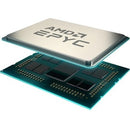Description
Lenovo AMD EPYC 7002 7402 Processor Upgrade (24-Core, 2.80 GHz)
Turn your data center into a competitive advantage with AMD’s EPYC 7002 family and Lenovo’s enterprise-grade integration. The Lenovo AMD EPYC 7002 7402 processor upgrade delivers a tetracosa-core powerhouse engineered for demanding workloads, superior performance, robust security, and scalable capacity. Built around the Socket SP3 platform, this upgrade is designed to install on the motherboard without soldering, enabling faster deployments, simplified maintenance, and minimized downtime. With 24 cores and 48 threads, a 2.80 GHz base clock, and abundant PCIe lanes, the 7402 accelerates virtualization, databases, analytics, HPC, and enterprise applications while preserving reliability and energy efficiency for data-centric environments.
- Powerful 24-core, 48-thread performance for demanding workloads. The AMD EPYC 7402 delivers robust multi-threaded power ideal for virtualization, large-scale databases, ERP, analytics, and high-performance computing. With a 2.80 GHz base clock and the Rome architecture, you gain strong throughput, lower latency, and consistent performance under peak demand, helping you consolidate workloads and reduce hardware sprawl. This translates into faster query processing, smoother virtual machine migrations, and improved batch processing across data-center operations.
- Plug-and-play SP3 upgrade path. The Socket SP3 design is tailored for Lenovo servers, allowing processor upgrades to be placed on the PCB without soldering. This design minimizes downtime during maintenance and delivers a streamlined upgrade process, preserving system reliability and uptime. Lenovo’s platform compatibility ensures BIOS and firmware support align with EPYC 7002, reducing integration risk.
- High I/O with PCIe lanes for expansive expansion. The 7402 provides up to 128 PCIe 3.0 lanes, delivering ample bandwidth for GPUs, NVMe storage, high-speed network adapters, and other accelerators. This capacity enables large-scale virtualization, real-time data processing, and data-center acceleration, letting you scale storage, networking, and compute without bottlenecks.
- Security and reliability built into the EPYC line. AMD’s EPYC 7002 processors incorporate security features such as memory encryption (SME) and secure virtualization (SEV), along with enterprise-grade reliability attributes like ECC memory support and robust error handling. When paired with Lenovo’s enterprise-grade infrastructure, you gain stronger protection for sensitive workloads, improved stability under heavy load, and fewer unplanned downtimes.
- Lenovo-optimized performance and upgrade path. This upgrade is engineered for Lenovo data-center servers, ensuring clean integration with Lenovo management tools, firmware stacks, and power management. The result is a seamless upgrade path that maximizes your existing Lenovo investments, extends server life, and delivers higher performance for virtualization, cloud, and enterprise workloads with predictable total cost of ownership.
Technical Details of Lenovo AMD EPYC 7002 7402
- Model: AMD EPYC 7002 Series 7402
- Cores: 24
- Threads: 48
- Base Clock: 2.80 GHz
- Socket: Socket SP3
- Processor Family: AMD EPYC 7002 (Rome)
- PCIe Lanes: Up to 128
how to install Lenovo AMD EPYC 7002 7402
Installing the Lenovo AMD EPYC 7002 7402 processor upgrade is designed to be straightforward for qualified technicians. Follow these general guidelines to ensure a safe and effective upgrade, while minimizing risk to the server and data.
- Prepare the server. Fully power down the system, unplug all cables, and discharge static electricity using an grounded antistatic strap. Verify the chassis is accessible and you have the correct Lenovo server model that supports the SP3 socket and EPYC 7002 family.
- Update prerequisites. Before installing the new CPU, boot into the system BIOS/UEFI to ensure the firmware is current and supports AMD EPYC 7002 processors. Install any recommended BIOS or firmware updates to avoid compatibility issues during the upgrade.
- Access the CPU socket. Remove any existing heatsink or cooling components following the manufacturer’s guidelines. Be careful to preserve surface cleanliness and avoid damage to the socket.
- Install the new processor. Align the 7402 with the SP3 socket according to the orientation key and seating marks. Gently place the processor into the socket, ensuring full contact without forcing the CPU into place. Engage the socket retention mechanism if applicable.
- Apply cooling and reassemble. Reinstall thermal paste (or reuse a correct thermal solution) and securely attach the heatsink/fan assembly. Reconnect power and all cables, and resume chassis closure according to your server’s guidelines.
- Power on and configure. Boot into BIOS/UEFI, confirm the CPU is detected, and apply recommended settings for AMD EPYC 7002 support. Run any vendor-provided diagnostics, then proceed to boot the operating system and install or update necessary drivers.
- Validation. After the OS is loaded, perform a validation test to ensure system stability under typical and peak workloads. Monitor temperatures, power delivery, and thermal throttling to confirm the upgrade delivers the expected performance.
Frequently asked questions
-
Is this upgrade compatible with my Lenovo server?
Compatibility depends on having a Socket SP3 motherboard and a Lenovo server that supports AMD EPYC 7002 processors. Always confirm model-specific processor support lists and BIOS version requirements before purchase. The SP3 socket is a key compatibility factor, along with Lenovo’s firmware and hardware integration.
-
What kind of performance improvements should I expect?
With 24 cores and 48 threads, you can expect substantial gains in virtualization density, database throughput, analytics workloads, and parallel processing. Expect faster query execution, improved multitasking, and smoother handling of large-scale workloads when the upgrade is paired with appropriate memory, storage, and cooling configurations.
-
Do I need to update the BIOS or firmware?
Yes. Ensure the server BIOS/firmware is up to date to support AMD EPYC 7002 processors. A BIOS update helps recognize the new CPU, enables correct power management features, and ensures system stability after installation.
-
Is cooling included with the upgrade?
No. CPU upgrades typically do not include a cooling solution. You should reuse your existing Lenovo-compatible heatsink and fan or procure an appropriate Lenovo-compatible cooling solution to ensure adequate thermal performance for the 7402.
Customer reviews
Showing - Of Reviews


